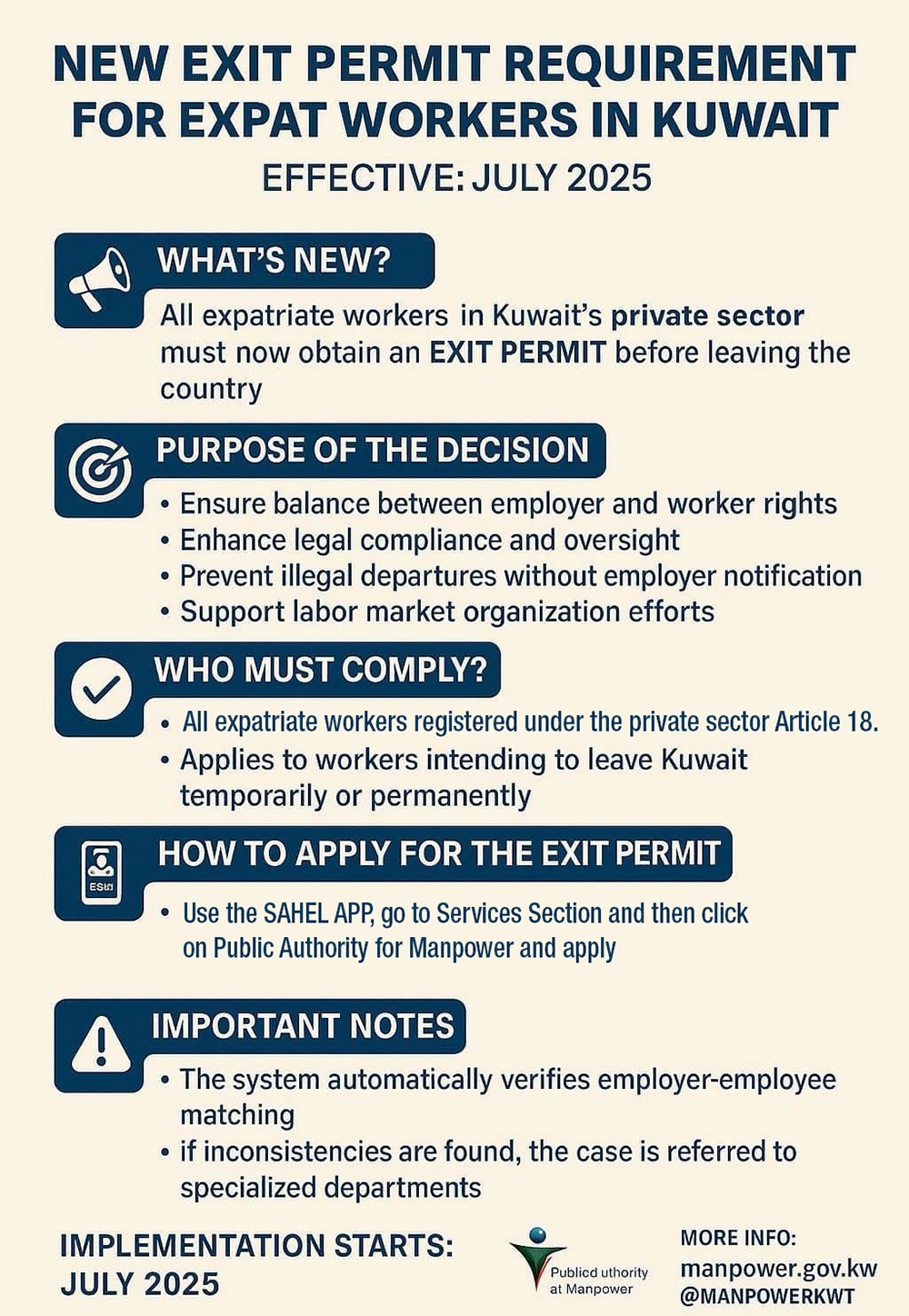Employer approval mandatory for Article 18 expats to exit Kuwait Starting from July 1
‘The mandatory digital exit permit system for private sector expatriate workers under Article 18 residency, effective July 1, 2025, spearheaded by the Public Authority for Manpower, aims to regulate worker mobility, prevent ‘runaways’, and protect employer rights; while the initiative aligns with Kuwait's digital transformation goals, it has drawn criticism from rights groups and expat communities over concerns about employer dominance and potential misuse.’

A mandatory exit permit policy, for all private sector expatriate workers under Article 18 residency, comes into force from Tuesday, 1 July.. This new policy requires expats to secure employer-approved digital authorization before any international travel — whether for vacation, business needs, or permanent departure. Public sector employees are exempt from this policy, and instead will continue to follow procedures required for travel by their respective ministries.
Spearheaded by the Public Authority for Manpower (PAM), the exit permit initiative is aimed at enhancing oversight of expat workers mobility, curbing undocumented absconding, protecting employer interests, and ensuring adherence to employment contracts under the sponsorship (Kafala) system.
The application process for an exit permit is entirely digital, streamlined through the government platforms, Sahel and Ashal. Workers input their travel details, including Civil ID number and departure dates, via the app. Employers must verify the request and approve it through the corresponding business interface.
Once approved, the permit, which is linked to the Civil ID number, is issued instantly and must be presented at immigration checkpoints, either digitally or in printed form. The system operates around the clock, and emergency requests are handled with priority.

However, the new policy has triggered criticism from human rights organizations and expat communities, who argue that it grants sponsors disproportionate control over workers’ freedom of movement. Fears include potential misuse, delays in emergencies, and denial of travel due to unresolved disputes. In response to these concerns, PAM has established an appeals mechanism, allowing workers to lodge complaints with labor relations offices if approvals are unfairly withheld.
The roll out of a similar policy in the education sector has been particularly impactful. With over 30,000 non-Kuwaiti teachers employed across Kuwait, the Ministry of Education initially introduced a policy that faced a surge in complaints as technical glitches and system unfamiliarity caused bottlenecks during peak vacation season. Delays left many teachers unable to travel as planned, prompting direct intervention by the Minister of Education Dr. Jalal Al-Tabtabaei.
In collaboration with the Civil Service Commission, the Education Ministry then introduced a revised workflow for public education employees (under Article 17). Teachers now have to first obtain internal approval at their schools, and then complete the digital application via the Sahel app. The permit remains valid for 90 days, and to ease congestion, school principals have been granted direct authority to approve applications, eliminating the need to forward requests to district offices. Schools were further instructed to submit group applications in advance during busy travel periods, ensuring smoother processing.
Assistant Undersecretary for General Education Mansour Al-Dhafiri formalized this shift through a directive decentralizing the exit permit process to school administrations. The move is part of the Ministry’s broader strategy to simplify services, reduce bureaucracy, and adopt digital-first solutions across government functions.
While some employers applaud the measure for improving labor discipline, expatriate workers remain wary. Labor advocates have urged authorities to incorporate safeguards such as time-bound approvals, emergency override provisions, and stricter oversight of employer behavior to prevent abuse.
Expatriates are encouraged to apply early, ensure open communication with their employers, and keep their exit permits accessible when traveling. Official updates will continue to be disseminated through PAM and the Ministry of Interior as the system evolves.
Kuwait’s adoption of the exit permit system represents a significant shift in labor policy, reflecting the country’s ongoing digital transformation and its efforts to balance national interests with the rights of a diverse expatriate workforce. As implementation progresses, the government is expected to refine the system based on public feedback, legal scrutiny, and operational realities on the ground.












